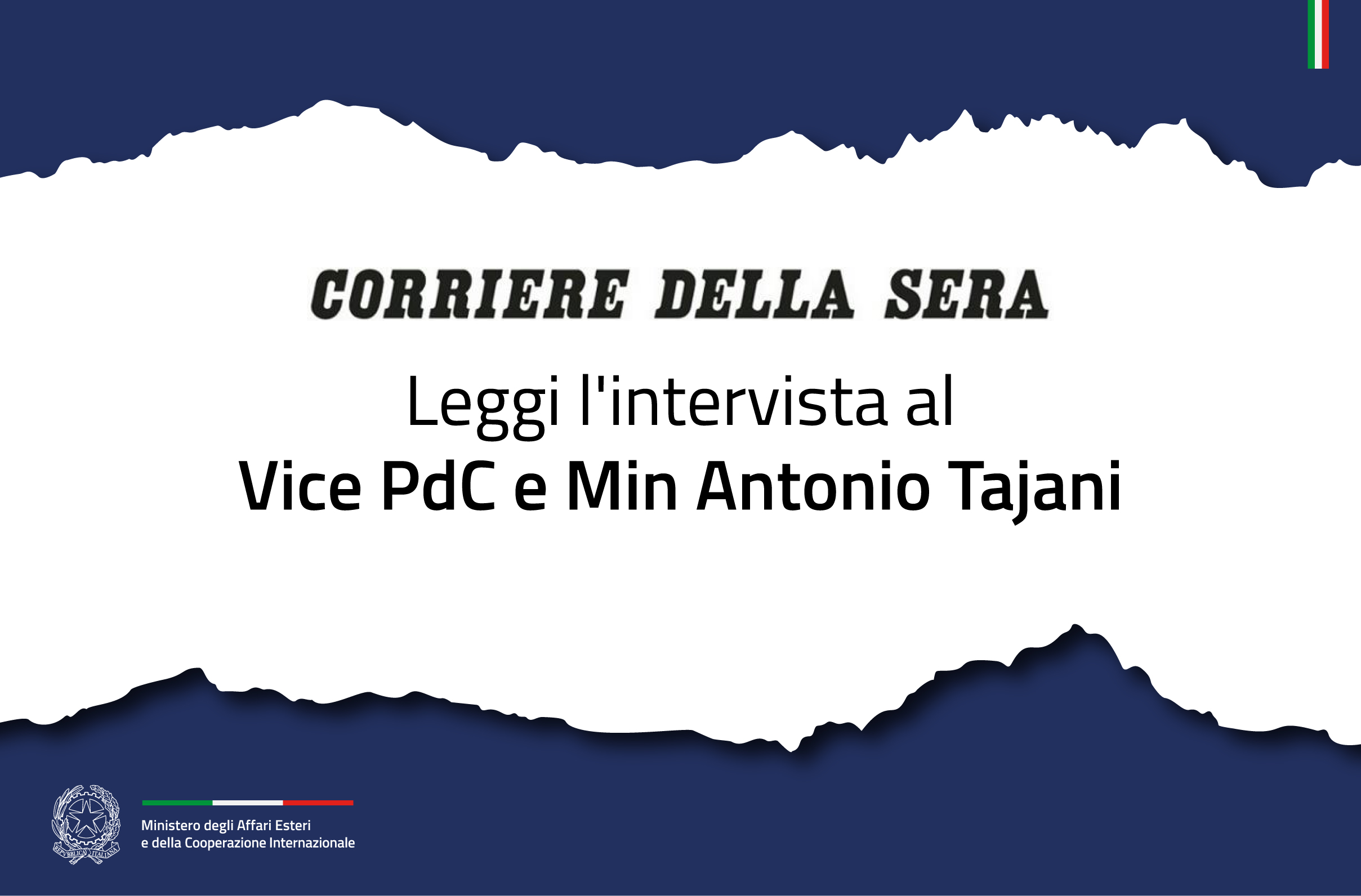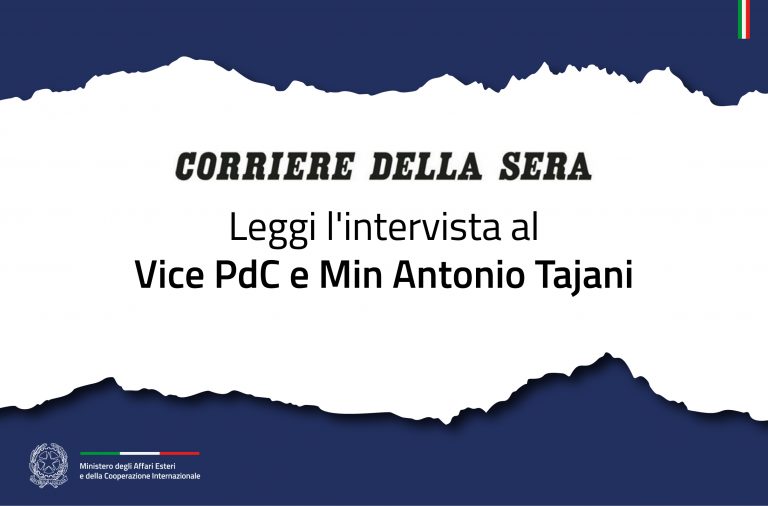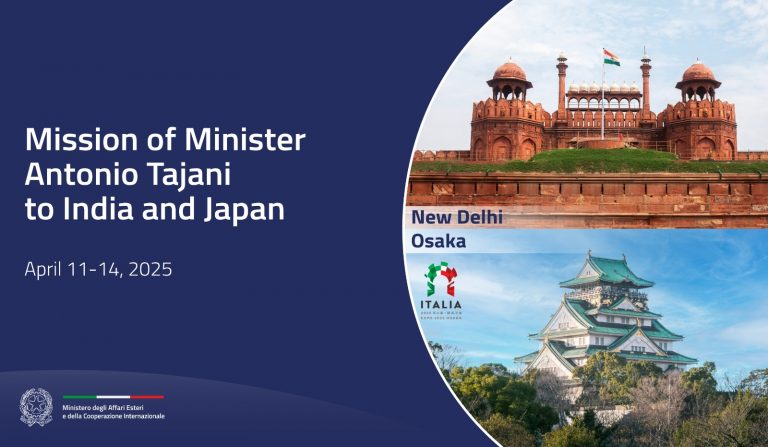We’re also exploring other markets, including Mexico, Canada, the Gulf countries, and Turkey. The United States remains our primary partner and ally – as does Europe.
He is about to board a plane to Japan after a visit to India, with further trips planned to Egypt at the end of April and to Mexico in mid-May. These are not just the usual duties of a Minister of Foreign Affairs and International Cooperation – roles that are increasingly interconnected in practice as well, following the recent reorganisation of the Italian Foreign Ministry into a “more agile and modern” structure, because, as Tajani notes, “economic policy and foreign affairs are now interlinked”. They also represent a concrete first response to the prospect of American tariffs and, above all, “to the requests coming from our entrepreneurs: to boost trade with new markets and make our export channels more accessible and diversified. Italian exports are currently worth over €623 billion, and by the end of the legislature we aim to reach €700 billion. That’s 40% of our GDP”. And all of this despite tariffs currently being suspended – though who knows what might happen tomorrow: “We would have pursued this strategy regardless, but now even more so”. This is not a hostile move, he clarifies: “The US is not our enemy – they remain our key political and trade partner, just like Europe. And that won’t change, regardless of who the current US president is”, says Antonio Tajani.
How do you prepare for such a complex operation in such a short time?
“We haven’t only just started – we’ve been working for some time to open, establish, or expand new markets, also thanks to the efforts of our agencies like ITA, SIMEST, SACE, and CDP. Specifically regarding tariffs, we’ve been active for months in countries like India – now a strategic political partner – and we’ve already scheduled a business forum in Brescia at the beginning of June focused on exports. Another example: there will be a major event in India on film, TV, audiovisuals, and media entertainment, to be held in Mumbai. We’re also working in markets such as Japan, Mexico, Canada, the Gulf countries, and Turkey. We’re even developing the “Cotton Route”, a supply chain that will stretch from India to the port of Trieste”.
Is the aim to shift the focus of our markets away from the US?
“We’re not abandoning our US or European markets, but at the same time we’re leveraging our presence in other countries – also by simplifying visa procedures, removing bureaucratic barriers, and supporting key sectors like tourism, culture, defence, and technology”.
Trump recently said he sees Europe as a single bloc, even in terms of tariffs. But individual countries, like Spain and China, are already acting independently. Isn’t there a risk of disunity within the EU?
“When it comes to China, we have a completely different relationship compared to the US. Europe and the US are the two faces of the West – united by shared values such as democracy and the rule of law. China is a trade partner, with whom we want to continue to maintain fruitful commercial relations. I take Trump’s words positively when he says Europe is a single interlocutor: the fact that EU Commissioner Šefčovič can negotiate on behalf of Europe is undoubtedly a good thing. The more Europe speaks with one voice, the stronger and more credible it is – both to protect our businesses and our citizens”.
So why is Prime Minister Meloni going to see Trump?
“Transatlantic relations are a priority of our foreign policy. The visit will serve to strengthen the ties between friendly nations who are part of NATO. “Within that context, we need to do more to reinforce the European pillar, including reaching the 2% of GDP defence spending target – which we have achieved.”
According to the opposition, there’s a risk we’ll look like we’re going to the US ‘cap in hand’…
“What cap? We’ve never done that, and we never will. Clearly, they don’t know Meloni. And in any case, this is an official visit – the Prime Minister received an invitation from the White House. Of course, she will talk about tariffs, not on behalf of the EU – that’s not our role – but she will support shared positions and the widely held goal of a free trade area between the US and Europe”.
In the meantime, Italy could face economic fallout. What would you say to business owners who are worried?
“My motto remains: ‘Don’t worry – act’. And that’s exactly what we’re doing. We’ll do everything we can to support companies that might face difficulties – including using funds from the NRRP (National Recovery and Resilience Plan) and cohesion funds to address potential industrial crises. But more will be needed”.
Such as?
“At the European level, the ECB must continue lowering interest rates to boost growth by facilitating access to credit. Moreover, the ECB should consider engaging in a new form of quantitative easing, similar to what was implemented during the Covid crisis – in other words, purchasing government bonds at low interest rates. To drive growth, we must take action – including easing certain Green Deal constraints that currently place us at a disadvantage”.




